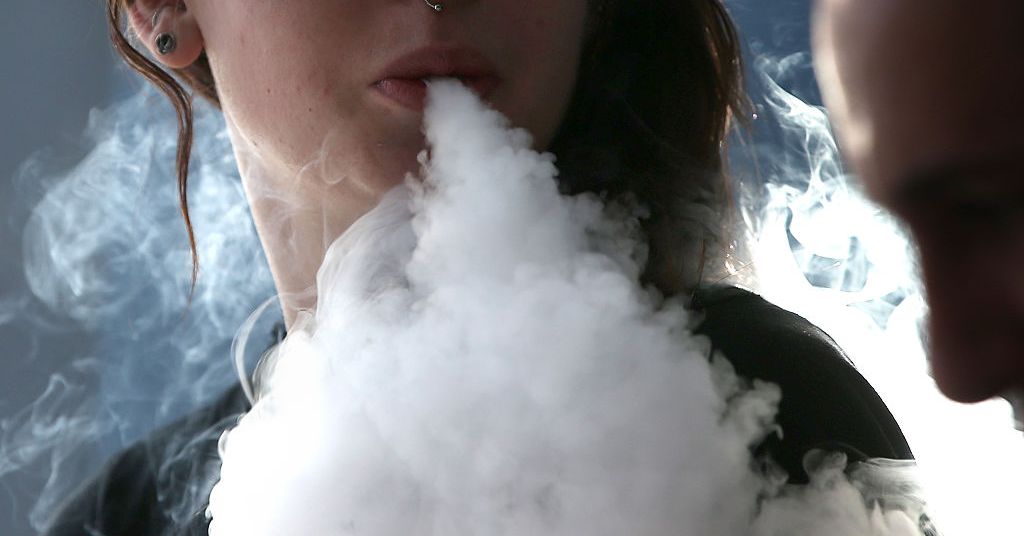In recent years, vaping has emerged as a popular alternative to traditional smoking. However, many individuals, particularly the younger demographic, are often curious or concerned about whether their dental health professionals can detect their vaping habits. This article delves into the various aspects of how dentists can identify if a patient vapes, including the signs they look for and the implications for oral health. And if you are looking for high-quality vape products, feel free to visit our vape shop first.
Understanding Vaping and Oral Health
Vaping, often viewed as a modern alternative to traditional smoking, has rapidly gained popularity, especially among younger demographics. It involves inhaling vapor created by an electronic cigarette (e-cigarette) or similar device. Unlike conventional cigarettes, which burn tobacco, e-cigarettes heat a liquid—commonly containing nicotine, flavorings, and other chemicals—to create vapor. This fundamental difference in operation leads to distinct health implications, particularly for oral health.
The impact of vaping on oral health is a growing area of research. While it’s often marketed as a safer alternative to smoking, early studies suggest that vaping is not without risks. The aerosol from vape devices can affect the mouth, teeth, and gums. Nicotine, a common ingredient in many e-liquids, is a known vasoconstrictor, reducing blood flow and potentially leading to gum tissue death and receding gum lines. Moreover, the flavoring agents and other chemicals in vape juices may also contribute to tooth decay and dry mouth, which can further exacerbate oral health problems by reducing saliva production, which is essential for neutralizing acids and washing away food particles.
As vaping continues to evolve, understanding its full impact on oral health remains crucial. Dentists and healthcare professionals are increasingly focusing on educating patients about the potential risks associated with vaping and encouraging practices that support oral health.
Can Your Dentist Tell If You Vape?
The short answer is yes. Dentists can often tell if you vape. This ability stems from their training and experience in spotting oral health issues that are characteristic of vaping. Vaping, like smoking, can leave specific signs in your mouth, throat, and even your overall oral health.
How Can Dentists Tell You Vape?
Dentists can identify vaping habits through several oral health indicators. These include:
- Dry Mouth: Vaping can cause xerostomia, or dry mouth because many vaping liquids contain propylene glycol, which can reduce saliva production. Saliva is essential for washing away food particles and neutralizing acids produced by bacteria. Without it, you’re at a higher risk for cavities and gum disease.
- Gum Issues: Vapers often experience gum inflammation, receding gum lines, and, in some cases, bleeding gums. Nicotine, a common ingredient in vape liquids, contributes to these conditions.
- Tooth Discoloration and Erosion: The chemicals in vaping liquids can also lead to tooth discoloration and erosion. Dentists can detect these changes during routine dental examinations.
- Oral Lesions: In some cases, vaping can cause oral lesions or sores inside the mouth, which are usually noticeable to a dentist during an oral examination.
Can a Dentist Tell If You Vape Rarely?
Even if you vape occasionally, a dentist might still be able to detect it, especially if oral health changes align with the signs mentioned above. However, the signs might be less pronounced compared to a regular vaper.
How to Hide That You Vape From Dentist
While it’s not advisable to hide health-related information from your medical professionals, some individuals may still seek ways to minimize the detectable signs of vaping. Here are a few tips:
- Maintain Good Oral Hygiene: Brushing twice daily, flossing regularly, and using mouthwash can help mitigate some oral health signs associated with vaping.
- Stay Hydrated: Drinking plenty of water can help alleviate dry mouth caused by vaping.
- Regular Dental Check-ups: Routine dental visits for cleanings and check-ups can help maintain oral health and possibly reduce the noticeable impacts of vaping.
However, it’s important to remember that these methods do not guarantee that a dentist won’t be able to tell if you vape. The most effective way to ensure your oral health is not affected by vaping is to quit the habit altogether.
The Role of Dentists in Addressing Vaping Habits
Dentists play a pivotal role in addressing the rising trend of vaping, especially given their unique position to observe the early signs of oral health issues related to this habit. Their role extends beyond just identifying the physical symptoms; it involves educating patients about the potential risks and impacts of vaping on oral health. This education is crucial, as many individuals, particularly the younger generation, might not be fully aware of the oral health consequences associated with vaping.
In routine dental check-ups, dentists have the opportunity to engage in conversations about vaping. They can inform patients about how ingredients found in vaping liquids, such as nicotine and other chemicals, can lead to dry mouth, gum disease, tooth decay, and other oral health problems. Importantly, dentists can offer personalized advice and preventive strategies tailored to each patient’s situation. This might include suggestions for increased dental hygiene practices, regular check-ups, and specific treatments to mitigate the adverse effects of vaping on oral health.
Furthermore, dentists can act as a bridge to additional resources, such as counseling or cessation programs, for those looking to quit vaping. By adopting a non-judgmental and supportive approach, dentists can encourage patients to disclose their vaping habits, fostering a more effective patient-dentist relationship. This open communication is vital for devising effective treatment plans and supporting oral and systemic health.
Summary
In conclusion, the relationship between vaping and oral health is a complex and evolving area of study. While vaping is often perceived as a safer alternative to traditional smoking, evidence suggests it still poses significant risks to oral health. Dentists can detect signs of vaping through various oral symptoms, including dry mouth, gum inflammation, tooth discoloration, and oral lesions. Their role in identifying these signs, educating patients, and providing targeted care is crucial in addressing the impacts of vaping. Understanding the chemical components of vape liquids and their effects, alongside maintaining robust oral hygiene practices, are key to mitigating these risks.
It is essential for individuals who vape to be aware of the potential oral health implications and to maintain transparency with their dentists. Open communication about vaping habits enables dentists to offer more effective, personalized care and guidance. Ultimately, prioritizing oral health and considering the potential risks associated with vaping are imperative steps toward maintaining overall health and well-being.

